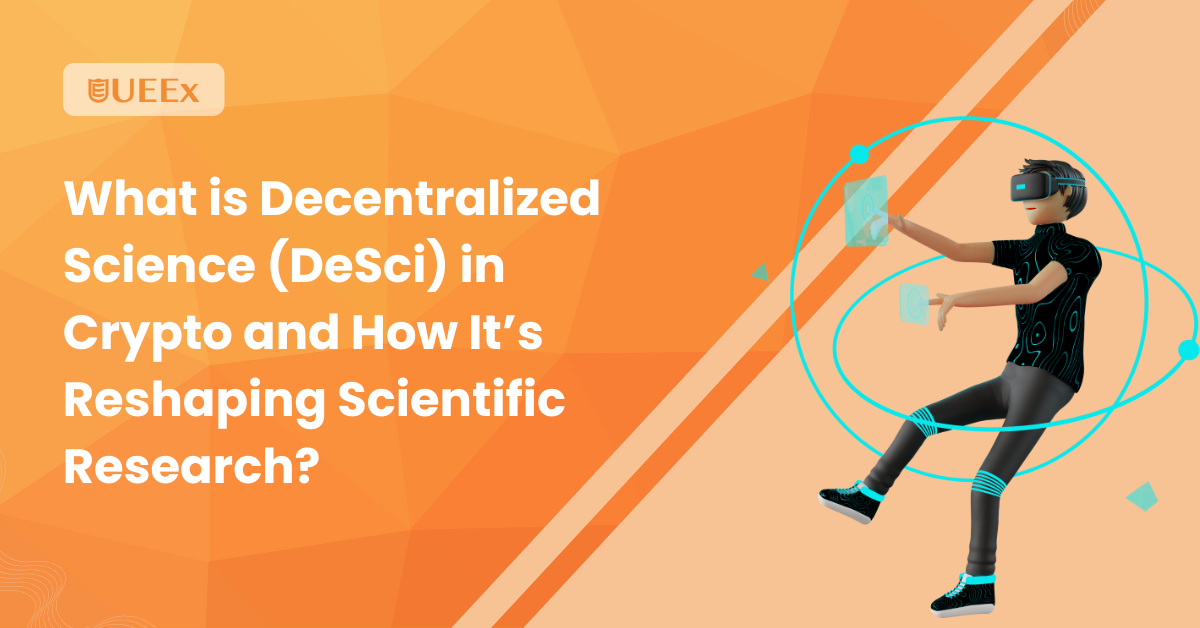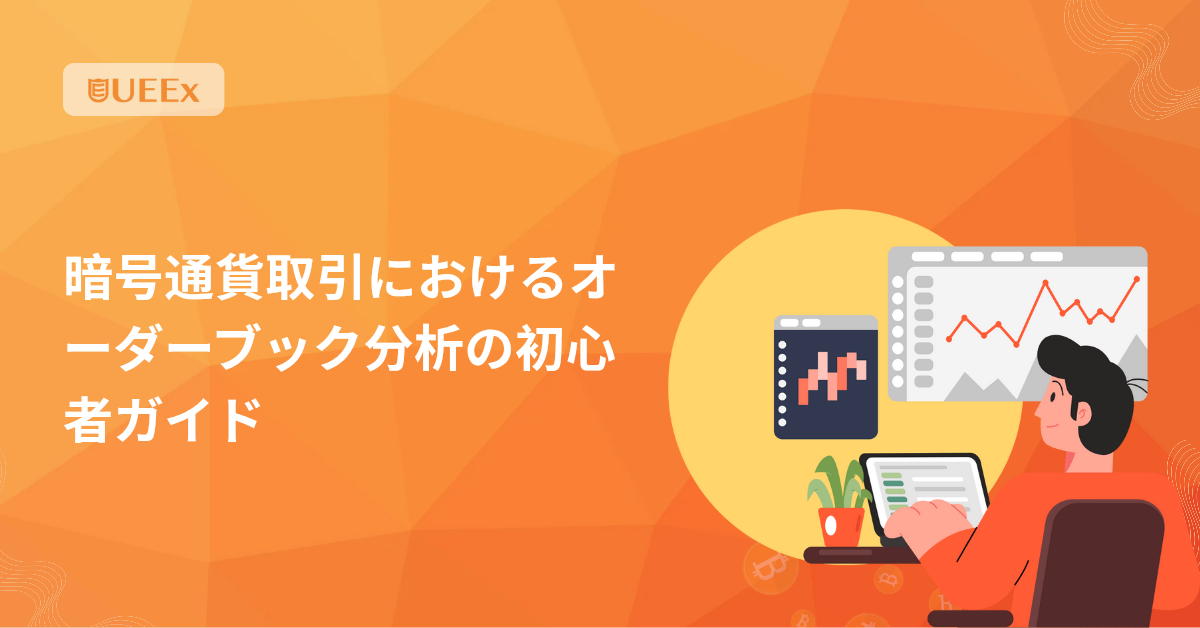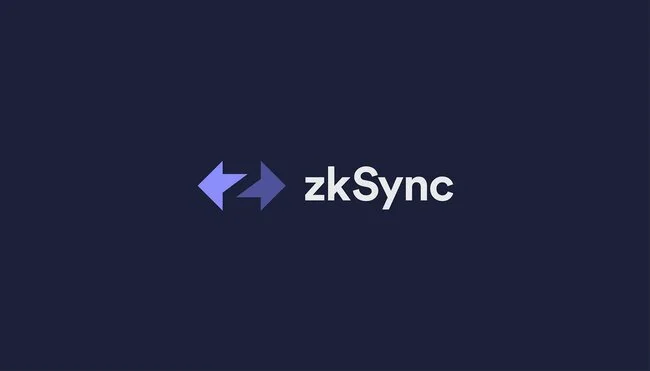When discussing innovative developments in scientific research, Decentralized Science (DeSci) stands out as a bold response to the long-standing issues in academia, which are limited access, skewed funding, and paywalled publications.
It leverages blockchain technology to enhance scientific research, making it more transparent, collaborative, and openly accessible. No more hidden data or slow publishing processes—DeSci proposes a model where scientific knowledge is shared, funded, and validated through decentralized protocols.
Built on core Web3 principles, DeSci enables researchers to tokenize intellectual property, access funding through DAOs, and publish their work without gatekeeping. By reducing reliance on centralized institutions, it opens the door to global participation.
In this post, we explore what Decentralized Science in crypto means and how it’s reshaping the future of scientific research.
Key Takeaways
- DeSci utilizes blockchain technology to enhance the transparency, accessibility, and community governance of scientific research.
- IP-NFTs and DAOs allow researchers to fund, manage, and monetize intellectual property without relying on traditional institutions.
- Platforms like Molecule, VitaDAO, and ResearchHub are creating practical tools for decentralized publishing, funding, and collaboration.
- DeSci supports open data sharing and reproducibility by storing research metadata and protocols on-chain.
- Despite challenges with regulation, governance, and technical adoption, DeSci holds strong potential to reshape global scientific practices.
What Is Decentralized Science (DeSci)?
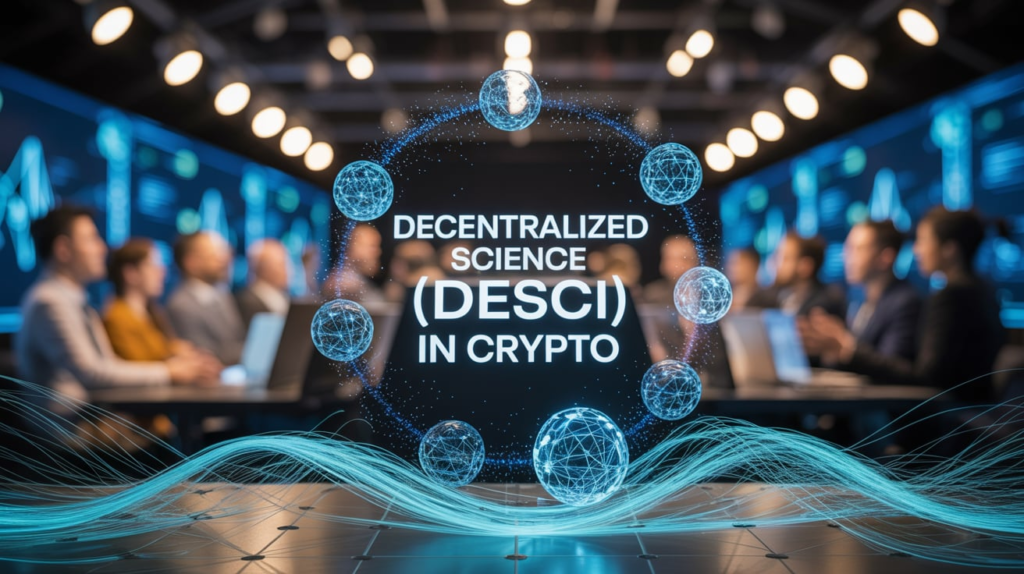
Source: Ideogram
Decentralized Science, or DeSci, is a blockchain-powered movement that aims to transform the way scientific research is funded, published, and accessed. It challenges the traditional, centralized academic system by promoting open collaboration, transparent data sharing, and permissionless participation.
Through decentralized protocols, researchers can publish their findings without institutional gatekeepers, secure funding through tokenized models, and protect intellectual property using blockchain-native tools, such as IP-NFTs.
The origins of DeSci can be traced back to the broader Web3 movement, where decentralization emerged as a solution to issues of trust and central control across various industries.
As blockchain matured, early experiments, such as Open Science and crypto-based publishing platforms, laid the groundwork for DeSci. Today, it continues to evolve through decentralized autonomous organizations (DAOs), cryptocurrency incentives, and global research communities seeking a fairer and more inclusive scientific model.
How DeSci Uses Blockchain Technology for Scientific Research

Source: Forbes
Decentralized Science (DeSci) integrates blockchain technology to reshape how scientific research is conducted, funded, and shared.
Unlike traditional systems where data is siloed, access is restricted, and incentives are often misaligned, DeSci leverages blockchain’s decentralized architecture to create a more transparent, inclusive, and efficient ecosystem for science.
Here’s how it works in practice:
Core Blockchain Innovations in DeSci
Tokenization of Intellectual Property (IP-NFTs)
One of the most impactful innovations in DeSci is the tokenization of scientific intellectual property using IP-NFTs (Intellectual Property Non-Fungible Tokens).
An IP-NFT is a blockchain-based token that represents ownership of a specific piece of scientific research, be it a dataset, a discovery, or a biotech invention. These tokens can be bought, sold, licensed, or fractionally owned, allowing researchers to monetize their work directly without relying on academic journals or corporate intermediaries.
For instance, Molecule and VitaDAO collaborated to fund longevity research by turning research projects into IP-NFTs.
In one notable example, VitaDAO invested $300,000 in June 2024 in the research of Dr. Michael Torres and Dr. Anthony Schwartz to suppress harmful protein formations that drive aging, by issuing an IP-NFT that gave token holders a stake in the research outcomes.
This model not only democratizes access to funding but also aligns incentives between researchers and supporters.
Use of DAOs for Community Governance
Decentralized Autonomous Organizations (DAOs) play a critical role in DeSci by enabling community-driven governance. In contrast to centralized academic institutions or research councils, DAOs use smart contracts and token-based voting to manage decisions, from allocating funds to approving projects.
For example, AthenaDAO, focused on women’s health research, allows members to propose, vote on, and fund research initiatives in a transparent manner. Contributors earn governance tokens, giving them a stake in the project’s success and ongoing direction. This structure streamlines bureaucracy and accelerates the research approval process.
Transparent On-Chain Data and Metadata
Another key advantage of blockchain is the immutability and transparency of data stored on-chain. DeSci platforms allow researchers to timestamp and publicly share datasets, methodologies, and results.
This addresses reproducibility issues, enhances data integrity, and enables real-time collaboration.
By recording research data and metadata (who authored it, when, and what changes were made), DeSci ensures traceability. A blockchain-based ledger provides proof of authorship and prevents tampering, which is crucial for maintaining scientific credibility.
For example, bioinformatics results, clinical trials, or experimental records can be time-stamped and verified on platforms like Bio.xyz, ensuring they’re accessible and auditable by any researcher globally.
Key Platforms and Protocols
Molecule Protocol
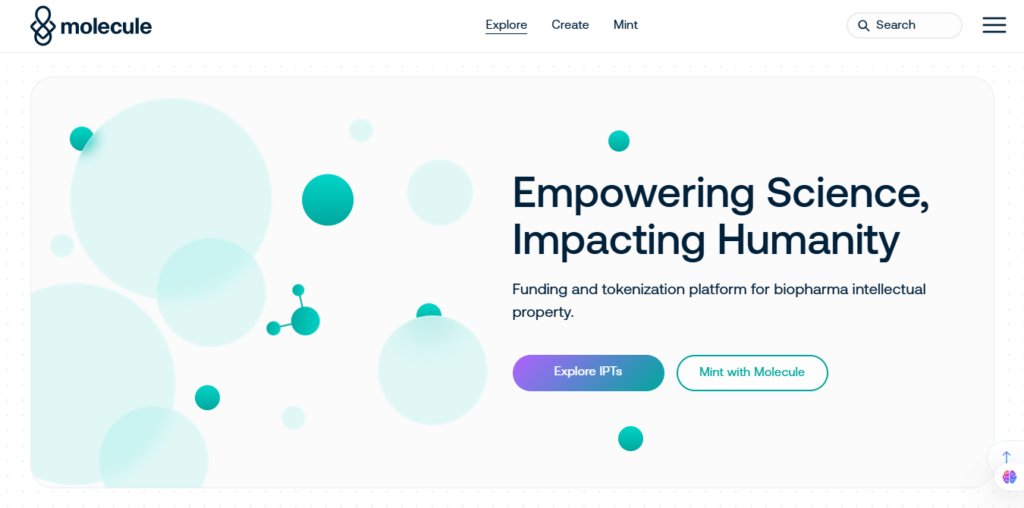
Molecule is a foundational infrastructure for DeSci. It connects researchers directly with funders and biotech enthusiasts through its IP-NFT framework. Researchers upload proposals, which are reviewed and potentially funded by DAOs or independent backers.
Once funded, the research is tied to an IP-NFT, creating a tradable and transparent ownership structure. Molecule has helped launch several early-stage biotech projects that would have struggled under traditional grant models.
VitaDAO, AthenaDAO, and ValleyDAO
VitaDAO focuses on longevity research. It has raised over $5 million to fund anti-aging and regenerative medicine, with contributors voting on which studies to support.

AthenaDAO aims to close the gender gap in medical research by funding studies on women’s health that are underrepresented. Through community governance, it allocates resources to address issues related to hormonal, reproductive, and mental health.

ValleyDAO targets synthetic biology and climate change research. By tokenizing IP in this space, it promotes open innovation for sustainable biotech solutions.
Each DAO operates independently but shares common blockchain tools, including governance tokens, treasury management, and smart contracts, to ensure trust and accountability.
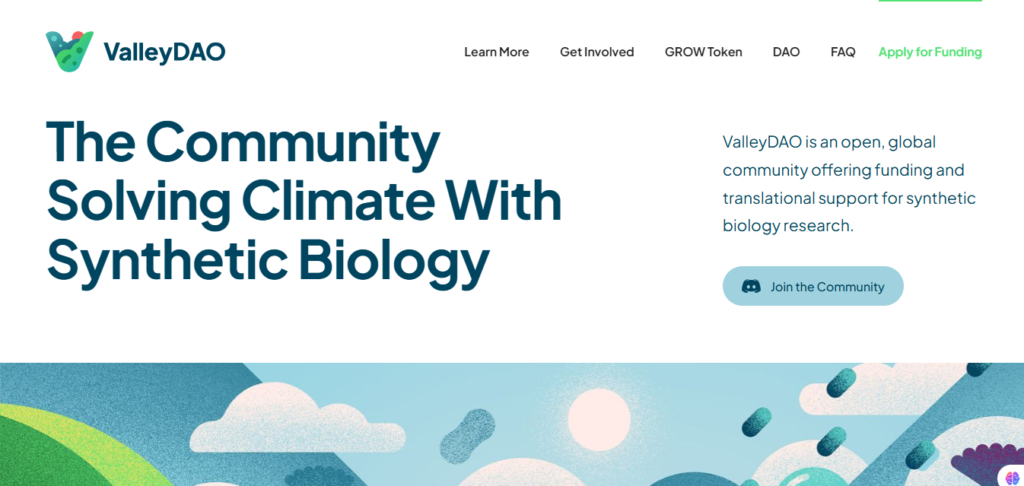
Bio.xyz serves as an accelerator for DeSci DAOs. It supports emerging research collectives by providing infrastructure and strategic guidance, enabling them to build governance models, launch tokens, and issue IP-NFTs.
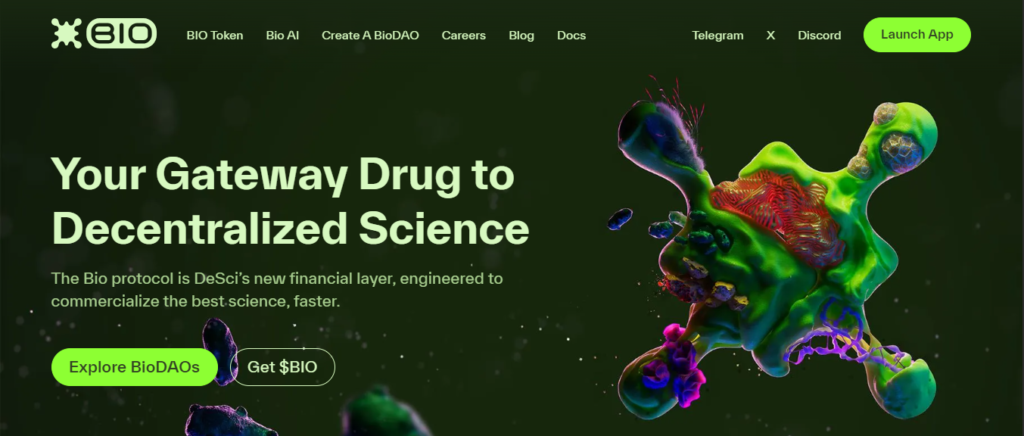
GenomesDAO and INNBC
GenomesDAO empowers individuals to store and control their genomic data securely using blockchain. Users can choose who accesses their genetic data and get compensated for it, protecting privacy while enabling research.
INNBC (Innovative Bioresearch Coin) supports research in HIV, cancer, and regenerative medicine. It utilizes its token to establish a DeSci ecosystem, where participants can fund projects and access research updates.
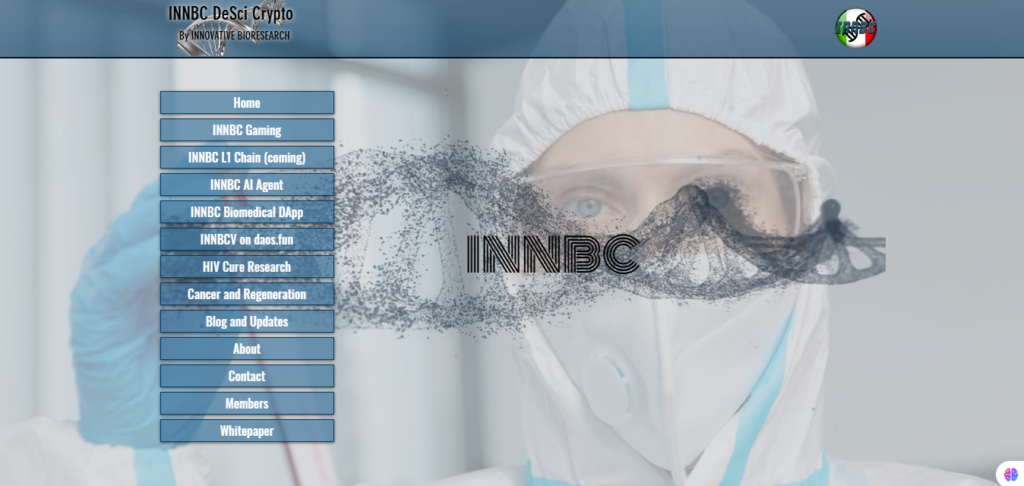
Use Cases of DeSci in Crypto
Below are the most important use cases where DeSci is already making a meaningful impact:
Academic Publishing
Traditional academic publishing is notoriously slow, expensive, and exclusionary. Centralized journals often charge high fees for both access and publication, limiting the dissemination of knowledge. DeSci introduces decentralized peer review systems and open-access journals, removing financial and institutional barriers.
Decentralized Peer Review and Journals
Blockchain allows peer reviews to be transparent, time-stamped, and tied to reviewer reputations. Reviewers can be rewarded with tokens for their contributions, creating an incentive to provide constructive and timely feedback.
Platforms like ResearchHub and Orvium are exploring these models, where every contribution, from uploading a paper to commenting on one, can earn crypto rewards.
Lower Barriers to Publication
By eliminating gatekeeping from major publishing houses, DeSci enables scientists to publish their findings directly on-chain or via decentralized repositories. This drastically reduces publication time and increases access.
Authors retain more rights over their work, and research can reach a broader audience without being hidden behind expensive paywalls.
Research Funding
One of the biggest challenges in science is accessing funding, especially for early-stage and unconventional ideas. Traditional grants often require lengthy applications and tend to favor established institutions or topics aligned with current funding priorities.
DeSci flips this model using blockchain-based crowdfunding and Decentralized Autonomous Organizations (DAOs).
Crowdfunding via Token Sales and DAOs
As we’ve mentioned earlier, Researchers can now tokenize their projects and raise funds from the global crypto community. Instead of relying solely on government or university grants, scientists issue utility or governance tokens linked to their research initiatives.
These tokens represent participation in the success or progress of the research and may offer voting rights or financial upside. DAOs like VitaDAO and AthenaDAO use community treasuries to vote on and fund promising proposals.
Risk-on Funding for Early-Stage Ideas
Traditional funding mechanisms are generally risk-averse, often ignoring speculative or high-impact innovation due to uncertainty. DeSci embraces a “risk-on” philosophy by enabling the crowd to back early research that institutional funders might overlook.
This model supports scientific innovation at its earliest and most experimental phase, where breakthroughs often occur.
Data Sharing and Collaboration
Science thrives on collaboration and reproducibility, but data silos and proprietary databases often hinder these goals. DeSci promotes open data environments, where datasets and findings are available on-chain and accessible to researchers globally.
Open Databases
Blockchain’s transparent and immutable nature allows researchers to store, share, and verify data in real time. Projects like GenomesDAO safeguard user privacy while enabling individuals to share their genetic data for research in exchange for tokens. Such systems enable global data access while maintaining consent and control.
On-chain Knowledge and Reproducibility
By recording data, methodologies, and research steps on-chain, DeSci enhances scientific reproducibility. Smart contracts ensure that experimental procedures are traceable and verifiable, addressing a core problem in science where nearly 70% of researchers report being unable to replicate experiments conducted by other scientists. Blockchain helps lock in research integrity by making data permanent, accessible, and auditable.
Intellectual Property Management
Intellectual property (IP) is central to science and innovation, but current systems are complex, slow, and often inaccessible to independent researchers. DeSci introduces IP-NFTs (Intellectual Property Non-Fungible Tokens) to simplify and democratize the intellectual property ownership process.
IP-NFTs and Monetization of Discoveries
IP-NFTs enable researchers to tokenize their discoveries, including patents, chemical formulas, and genetic sequences, and represent them as tradable digital assets.
These tokens can be licensed, sold, or shared with multiple stakeholders, including decentralized autonomous organizations (DAOs), investors, and the general public.
Molecule’s collaboration with VitaDAO demonstrates this in action, where university-backed research has been turned into IP-NFTs that funders and community members can own a stake in.
This model opens up entirely new pathways for monetization, enabling scientists to receive ongoing royalties while also making research outcomes more accessible and fundable. It aligns incentives for open innovation and reduces dependence on slow-moving patent offices or costly legal processes.
How DeSci Enhances Scientific Practices
Decentralized Science (DeSci) introduces a transformative layer of efficiency, openness, and equity to the way scientific work is conducted, shared, and funded.
Here’s how DeSci enhances scientific practices:
Accessibility and Inclusion
One of DeSci’s most immediate impacts is expanding access to scientific participation and information.
Traditional systems often favor researchers affiliated with prestigious institutions and restrict access to knowledge through expensive journal subscriptions and conference paywalls. DeSci eliminates these barriers by promoting open-access publishing, decentralized data sharing, and permissionless participation.
With blockchain-powered platforms, scientists from underrepresented or underfunded regions can contribute to and benefit from research without needing institutional backing.
Improved Reproducibility
Reproducibility is the cornerstone of credible science, yet it remains one of the field’s most pressing challenges. Studies suggest that more than 70% of published research cannot be replicated due to missing data, lack of transparency in methods, or flawed peer review processes.
DeSci addresses this by ensuring that data, methodologies, and experimental results are recorded immutably on-chain.
Researchers can timestamp every step of their process, from hypothesis formation to final results, using smart contracts, which ensures that other scientists can verify, audit, and reproduce the work. This transparency significantly enhances accountability and fosters confidence in scientific outputs.
Efficient Fund Distribution
Traditional science funding is slow, competitive, and often influenced by politics. Lengthy grant applications, centralized decision-making, and limited funding pools restrict the speed and direction of innovation. DeSci replaces this with community-driven, on-chain fund allocation through DAOs and token-based incentives.
Trust and Transparency
Trust in scientific processes has eroded in recent years due to opaque peer review systems, unreproducible findings, and concerns about data manipulation. DeSci rebuilds this trust through blockchain’s transparency, immutability, and decentralized consensus mechanisms.
By publishing research data, peer reviews, and funding sources on public ledgers, DeSci ensures that stakeholders, including researchers, funders, and the general public, can verify the legitimacy of scientific activities.
Decentralized Science vs Traditional Science
Decentralized Science (DeSci) and traditional science represent two fundamentally different approaches to conducting and managing scientific research.
While traditional science relies on centralized institutions, paywalled journals, and hierarchical grant systems, DeSci introduces decentralized models powered by blockchain technology that emphasize transparency, open access, and community-driven funding.
Below is a detailed comparison:
| Feature | Traditional Science | Decentralized Science (DeSci) |
| Access to Research | Restricted via paywalled journals and institutional libraries | Open-access platforms; anyone can publish, read, and contribute |
| Funding Mechanism | Centralized grants, slow review processes, and biased distribution | Community-governed DAOs, token-based funding, fast, transparent distribution |
| Peer Review | Anonymous, opaque, and often biased | Transparent, token-incentivized peer review; reputation-based contributions |
| Reproducibility | Often lacks data or methodology for reproduction | On-chain data storage and transparent protocols for reproducibility |
| Intellectual Property | Managed through patents and legal systems, slow and expensive | Tokenized IP (IP-NFTs), fractional ownership and monetization |
| Incentives for Participation | Limited recognition; heavily favors institutional affiliations | Token rewards for publishing, reviewing, and contributing to data |
| Data Storage and Sharing | Siloed in universities, private labs, or behind paywalls | Open, distributed, and often encrypted on-chain databases |
| Governance and Decision-Making | Hierarchical, led by universities, publishers, and funding bodies | Community-led governance through DAOs and democratic voting systems |
| Innovation Funding | Conservative and risk-averse; favors established research directions | Risk-tolerant; supports early-stage, high-impact, and underfunded ideas |
| Transparency and Trust | Limited insight into processes, funding sources, and peer reviews | Transparent records, open peer review, visible funding trails on the blockchain |
Challenges and Limitations of DeSci
The integration of blockchain and decentralized systems into traditionally centralized and regulated domains raises several technical, legal, and practical concerns.
Here are the challenges and limitations facing DeSci today:
On-Chain Data Storage and Scalability
One of the primary technical challenges in DeSci is storing large datasets on-chain. Scientific research often involves massive volumes of data, such as genomic sequences, clinical trial results, and imaging files, which are impractical and expensive to store directly on blockchain networks.
Solutions like IPFS (InterPlanetary File System) and Arweave are being explored for decentralized storage, but these systems still face issues related to speed, security, redundancy, and long-term accessibility.
Ensuring that large datasets remain verifiable, accessible, and tamper-proof without compromising performance remains a significant hurdle.
Legal and Compliance Uncertainty
The use of tokenized intellectual property (IP-NFTs), decentralized governance, and anonymous contributors introduces complex legal questions. Most national legal systems do not yet recognize IP-NFTs as enforceable property rights, which creates ambiguity around licensing, patenting, and dispute resolution.
Moreover, decentralized autonomous organizations (DAOs) may face regulatory scrutiny, especially when handling funds, issuing tokens, or managing biomedical data.
For example, in the U.S., biotech research is subject to FDA regulations—compliance in a decentralized setting poses significant challenges that have yet to be fully resolved.
Quality Control and Scientific Integrity
While DeSci encourages broader participation in research, this open model also risks lowering the quality threshold. Without centralized editorial oversight, there’s potential for misinformation, poorly designed experiments, or even fraudulent data to be published and distributed.
Although token-based reputation systems are being used to incentivize integrity, they are not yet mature or widespread enough to replace the rigorous peer-review standards of traditional science. Balancing openness with academic rigor remains a critical challenge.
DAO Governance at Scale
Most DeSci projects rely on DAOs to make collective decisions regarding funding, project approvals, and policy changes. However, decentralized governance is still an evolving concept. Issues such as low voter turnout, centralization of power among early token holders, and governance manipulation are common in DAO ecosystems.
As more complex and high-stakes scientific projects move into DAO governance, there is a growing need for better decision-making frameworks, transparent delegation mechanisms, and robust participation incentives.
User Adoption and Technical Barriers
Many scientists and researchers are unfamiliar with blockchain technology, crypto wallets, or decentralized governance. This creates a high barrier to entry for those who wish to participate in DeSci but lack the technical skills or resources.
Educational initiatives and user-friendly platforms are essential for bridging the gap between the scientific and crypto communities. Until the onboarding process becomes more seamless, adoption will remain limited to tech-savvy researchers and crypto-native users.
Sustainability and Incentive Design
DeSci platforms often rely on token incentives to drive participation in peer review, data sharing, and governance. However, poorly designed tokenomics can lead to short-term speculation rather than long-term scientific engagement. Ensuring that incentives align with meaningful scientific outcomes, rather than just financial returns, is an ongoing challenge.
Additionally, projects need sustainable funding models. While initial DAO treasuries or token sales can jump-start a community, long-term maintenance, infrastructure development, and compensation for contributors require consistent and sustainable capital.
Future of DeSci and Its Role in Crypto
The future of Decentralized Science (DeSci) is closely tied to the broader adoption of Web3 technologies and crypto infrastructure.
As blockchain matures, DeSci is positioned to redefine how scientific research is conducted, funded, and shared, shifting power from centralized institutions to global, open communities.
In the coming years, we can expect increased integration of IP-NFTs, tokenized funding, and DAO-led research hubs that empower scientists with direct access to resources and collaborators.
DeSci will likely serve as a critical use case for crypto beyond finance, showcasing blockchain’s potential in real-world applications like healthcare, climate science, and biotechnology.
As regulatory clarity improves and platforms become more user-friendly, DeSci could become a cornerstone of innovation in the decentralized internet era.
Final Thoughts
In conclusion, Decentralized Science (DeSci) represents a practical and innovative shift in how research is conducted, funded, and shared, utilizing blockchain and cryptocurrency tools. By enhancing transparency, access, and efficiency, DeSci unlocks genuine opportunities for global collaboration and scientific advancement.
With platforms like Molecule, VitaDAO, and ResearchHub leading the way, the integration of DeSci in crypto shows strong potential for long-term impact. As blockchain adoption grows, DeSci could play a central role in shaping the future of open and trusted scientific discovery.
Frequently Asked Questions
Crypto DeSci is a movement that uses blockchain and cryptocurrency tools to decentralize scientific research, enabling open access, community funding, tokenized intellectual property, and transparent data sharing.
DeFi, or Decentralized Finance, is a sector in cryptocurrency that utilizes blockchain technology to provide financial services such as lending, borrowing, and trading, all without relying on banks or centralized intermediaries.
A Bio Protocol is a blockchain-based platform that enables scientists to share, collaborate on, and fund biological research projects using decentralized tools like tokenization and DAOs.
BIO Protocol has attracted investment from several prominent venture capital firms and organizations:Binance Labs: The venture capital arm of Binance, marking its first investment in the decentralized science (DeSci) sector. 1kx: A venture capital firm based in the Netherlands.Boost VC: A U.S.-based venture capital firm.Northpond Ventures: A U.S.-based venture capital firm. Zee Prime Capital: A venture capital firm.Panga Capital: A venture capital firm, and so on.
An example of a DeFi (Decentralized Finance) platform is Uniswap, a decentralized exchange that allows users to swap cryptocurrencies directly without intermediaries.
